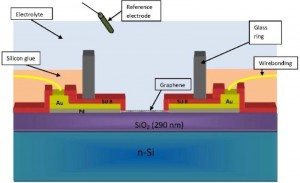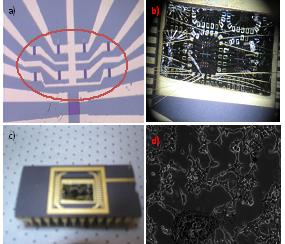Solution-gated Graphene FET Arrays for pH and Biosensing
Thanks to the outstanding combination of its very small thickness (just one atom thick) and very high carrier mobility, graphene holds great potential for bioelectronic applications and, more specifically, high-sensitivity pH measurements and biosensing. Small changes in the liquid environment surrounding the graphene device induce changes in the transport properties of graphene that can easily be detected electronically.
Our group is currently developing solution-gated graphene field-effect transistor (SGFET) arrays that can operate in various liquid environments. Figure 1 shows a diagram of the graphene biosensor device and operating procedure. We use graphene grown by chemical vapor deposition as the active channel of these new devices. After the fabrication of graphene transistors with our standard technology, an SU8-based encapsulation technology has been developed to protect the contacts and wires from the electrolyte.
Part of our on-going work focuses on functionalizing the graphene surface to make it selective to specific analytes. In addition, we have demonstrated that HEK 293 cells can grow and survive on our graphene films with good adhesion, which paves the way for cellular recording with graphene. Currently, we are characterizing our SGFETs and deriving high transconductances that emphasizes the high sensitivity of our devices. In summary, our study aims at demonstrating that graphene with its scalable technology, high sensivity and low noise has the potential to surmount the abilities of existing silicon technologies for pH and biosensing applications. [1] [2] [3]
- Figure 1: Schematic illustration of the experimental setup for a graphene solution-gated FET.
- Figure 2: a) Optical microscope image of the graphene FET arrays. b) Chip with graphene FET arrays that are wirebonded to a chip carrier. c) A glass funnel is glued onto the chip carrier and electrolytes are poured into the funnel and are in contact with the FET arrays. d) Optical microscope image of HEK 293 cells on graphene.
References
- Y. Ohno, K. Maehashi, Y. Yamashiro, and K. Matsumoto, NANO LETTERS 2009 Vol. 9, No. 9,3318-3322. [↩]
- M. Dankerl, S. Eick, B. Hofmann, M. Hauf, S.Ingebrandt, A. Offenhausser, M. Stutzmann, and J.A. Garrido, Adv Funct Mat., Vol. 19, Issue 18 p. 2915. [↩]
- P.K. Ang, W. Chen, A.T.S. Wee, and K.P. Loh, J. Am. Chem. Soc. 2008, 130, p. 14392. [↩]

